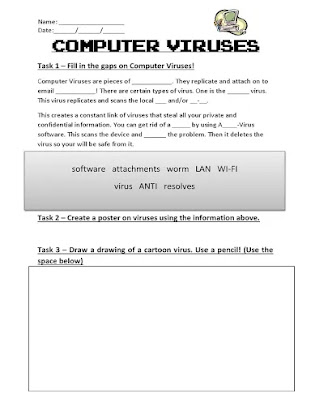JS3 CLASS - ONLINE CLASS TASK_COMPUTER VIRUS (COMPUTER STUDIES)
ASSESSMENT TASK
PART A
1. What is a computer virus?
a) A program designed to protect your computer
b) A program designed to improve computer performance
c) A program designed to harm or disrupt computer operation
d) A program designed to enhance internet speed
2. Which of the following is NOT a common way computer viruses spread?
a) Email attachments
b) Social media posts
c) USB flash drives
d) Voice commands
3. What is the primary purpose of a computer virus?
a) To make your computer run faster
b) To steal personal information
c) To damage or corrupt data
d) To improve internet security
4. Which of the following is an example of a preventive measure against computer viruses?
a) Regularly updating antivirus software
b) Sharing passwords with friends
c) Downloading files from unknown sources
d) Ignoring software updates
5. What is the term for a program that appears legitimate but performs malicious activities?
a) Trojan horse
b) Spyware
c) Firewall
d) Antivirus
6. Which of the following actions is NOT recommended to avoid computer viruses?
a) Opening email attachments from unknown senders
b) Using strong and unique passwords
c) Installing antivirus software
d) Keeping software and operating systems updated
7. What does a firewall do in relation to computer viruses?
a) Blocks unauthorized access to a computer network
b) Speeds up internet connection
c) Increases the risk of virus infection
d) Protects against hardware failure
8. What is the most common type of computer virus?
a) Worm
b) Trojan horse
c) Adware
d) Ransomware
9. What is the term for a program that replicates itself and spreads to other computers or networks?
a) Virus
b) Trojan horse
c) Worm
d) Spyware
10. What should you do if you suspect your computer is infected with a virus?
a) Disconnect it from the internet and run antivirus software
b) Share the issue on social media
c) Ignore the problem and continue using the computer
d) Email everyone in your contact list about the virus issue
PART B
- Imagine
you receive an email from an unknown sender with an attachment. What would
be the safest course of action to avoid potential virus infection?
- If
your computer starts behaving strangely, such as running unusually slow or
showing frequent pop-up ads, what might be a possible explanation for this
behavior?
- Consider
a scenario where you download a game from a website that claims to be
free. After installing the game, you notice strange behavior on your
computer. What steps could you take to investigate whether your computer
has been infected with a virus?





Comments
Post a Comment